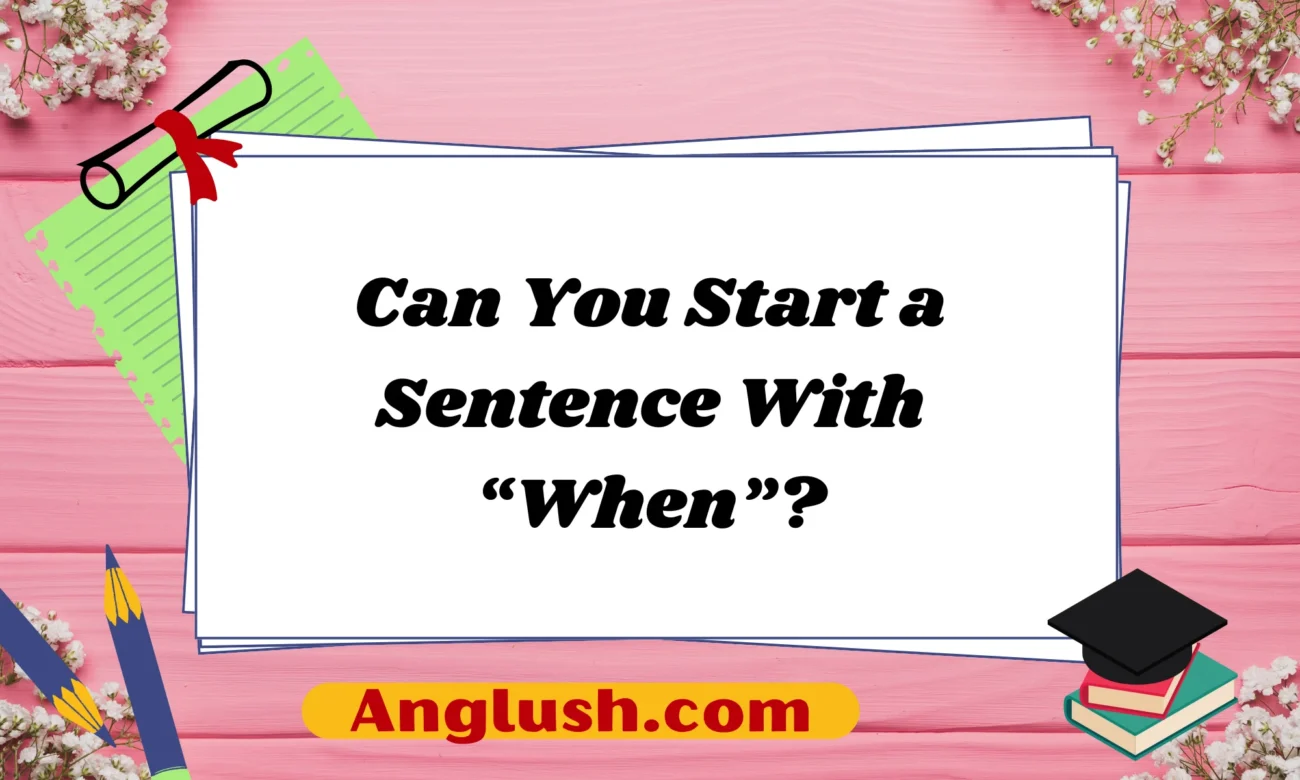Introduction
Many English learners and even native speakers often wonder whether it is correct to start a sentence with “when.” The short answer is yes! “When” is commonly used at the beginning of sentences in both formal and informal contexts. It can introduce questions, dependent clauses, and various expressions of time. However, the way you structure your sentence after “when” matters, especially if you want to sound professional, polite, or casual, depending on the context.
In this article, we will explore different ways to use “when” at the beginning of a sentence, alternative ways to phrase sentences for different tones, and practical examples for both written and spoken English.
Is It Correct to Start a Sentence With “When”?
Yes! You can start a sentence with “when” in various ways. Here are three common uses:
- As a question:
- “When will you be available for the meeting?”
- “When did you last see her?”
- As a dependent clause:
- “When I arrived at the office, everyone was already working.”
- “When the sun sets, the sky turns orange.”
- As an introductory phrase for emphasis:
- “When used correctly, ‘when’ can make your writing clearer and more engaging.”
Each of these uses is grammatically correct, but it is essential to ensure that your sentence is structured properly to avoid confusion.
Different Ways to Start a Sentence Without Using “When”
Sometimes, you may want to avoid repetition or make your sentence sound more formal. Here are some alternative ways to express the same idea without starting with “when.”
1. Using “At the Time That” or “During the Time”
These phrases are excellent for maintaining clarity in formal writing.
- Instead of: “When I arrived at the event, the keynote speaker had already started.”
- Try: “At the time that I arrived at the event, the keynote speaker had already started.”
- Instead of: “When she was in college, she studied abroad.”
- Try: “During the time she was in college, she studied abroad.”
2. Using “As Soon As” or “Once”
These alternatives work well for emphasizing immediacy.
- Instead of: “When I finished my project, I sent it to my manager.”
- Try: “As soon as I finished my project, I sent it to my manager.”
- Instead of: “When we completed the task, we celebrated.”
- Try: “Once we completed the task, we celebrated.”
3. Using “While” or “Throughout”
These words are useful for expressing events happening simultaneously.
- Instead of: “When he was studying, he listened to music.”
- Try: “While he was studying, he listened to music.”
- Instead of: “When she worked at the company, she gained valuable experience.”
- Try: “Throughout her time at the company, she gained valuable experience.”
4. Using “If” or “In Case”
If the sentence suggests a condition rather than a definite time, “if” or “in case” may be better alternatives.
- Instead of: “When you need help, call me.”
- Try: “If you need help, call me.”
- Instead of: “When there is an emergency, follow the safety protocol.”
- Try: “In case of an emergency, follow the safety protocol.”
5. Using “After” or “Upon”
If referring to something happening afterward, “after” or “upon” might sound more polished.
- Instead of: “When I completed my work, I took a break.”
- Try: “After completing my work, I took a break.”
- Instead of: “When they announced the winner, the crowd cheered.”
- Try: “Upon the announcement of the winner, the crowd cheered.”
Texting Examples: Using “When” in Everyday Communication
Here are 10 user-friendly examples optimized for Google, showing how you can use “when” in texting while maintaining a natural flow:
- “When are you free to talk?” (Casual)
- “When do you plan to arrive?” (Neutral)
- “When the meeting ends, let’s grab coffee.” (Friendly)
- “When will you send the report?” (Professional)
- “When I saw this, I immediately thought of you!” (Casual & Warm)
- “When the concert starts, text me your location.” (Casual)
- “When you finish reviewing the document, let me know.” (Work-Related)
- “When possible, send me the updated files.” (Polite & Professional)
- “When is your next available slot?” (Professional)
- “When the package arrives, can you bring it inside?” (Casual & Direct)
How to Choose the Best Alternative Depending on Context
Choosing whether to start a sentence with “when” or an alternative depends on the situation:
- Formal writing (reports, emails, research papers): Consider using “Upon,” “After,” or “At the time that” for a more polished tone.
- Professional emails & communication: Use “If,” “Once,” or “As soon as” to sound more direct yet polite.
- Casual conversations & texting: “When” is generally fine, but “While,” “After,” or “Whenever” can add variety.
- Storytelling & narration: “When” works well, but alternatives like “Throughout” or “During” can improve flow.
Final Thoughts
Yes, you can absolutely start a sentence with “when.” It is a common and grammatically correct way to introduce time-related statements or questions. However, depending on formality, audience, and context, you may want to vary your phrasing. Using alternatives such as “As soon as,” “While,” “Upon,” and “During” can help improve clarity and professionalism in your writing.
Next time you find yourself using “when” frequently, try switching it up with some of these alternatives to enhance your communication skills!

